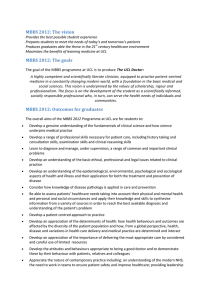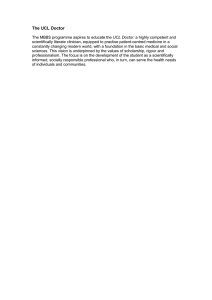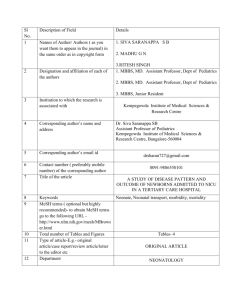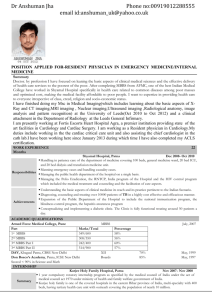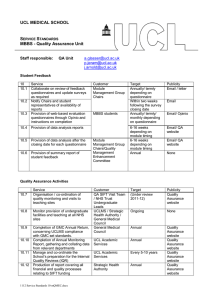ASER EVALUATIVE REPORT AND DEVELOPMENT & ENHANCEMENT PLAN Academic Session: 2014/15 Department:
advertisement
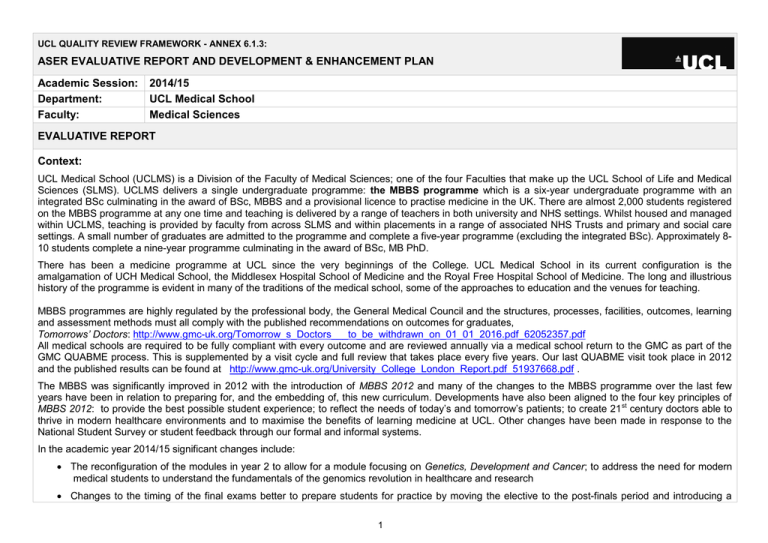
UCL QUALITY REVIEW FRAMEWORK - ANNEX 6.1.3: ASER EVALUATIVE REPORT AND DEVELOPMENT & ENHANCEMENT PLAN Academic Session: Department: Faculty: 2014/15 UCL Medical School Medical Sciences EVALUATIVE REPORT Context: UCL Medical School (UCLMS) is a Division of the Faculty of Medical Sciences; one of the four Faculties that make up the UCL School of Life and Medical Sciences (SLMS). UCLMS delivers a single undergraduate programme: the MBBS programme which is a six-year undergraduate programme with an integrated BSc culminating in the award of BSc, MBBS and a provisional licence to practise medicine in the UK. There are almost 2,000 students registered on the MBBS programme at any one time and teaching is delivered by a range of teachers in both university and NHS settings. Whilst housed and managed within UCLMS, teaching is provided by faculty from across SLMS and within placements in a range of associated NHS Trusts and primary and social care settings. A small number of graduates are admitted to the programme and complete a five-year programme (excluding the integrated BSc). Approximately 810 students complete a nine-year programme culminating in the award of BSc, MB PhD. There has been a medicine programme at UCL since the very beginnings of the College. UCL Medical School in its current configuration is the amalgamation of UCH Medical School, the Middlesex Hospital School of Medicine and the Royal Free Hospital School of Medicine. The long and illustrious history of the programme is evident in many of the traditions of the medical school, some of the approaches to education and the venues for teaching. MBBS programmes are highly regulated by the professional body, the General Medical Council and the structures, processes, facilities, outcomes, learning and assessment methods must all comply with the published recommendations on outcomes for graduates, Tomorrows’ Doctors: http://www.gmc-uk.org/Tomorrow_s_Doctors___to_be_withdrawn_on_01_01_2016.pdf_62052357.pdf All medical schools are required to be fully compliant with every outcome and are reviewed annually via a medical school return to the GMC as part of the GMC QUABME process. This is supplemented by a visit cycle and full review that takes place every five years. Our last QUABME visit took place in 2012 and the published results can be found at http://www.gmc-uk.org/University_College_London_Report.pdf_51937668.pdf . The MBBS was significantly improved in 2012 with the introduction of MBBS 2012 and many of the changes to the MBBS programme over the last few years have been in relation to preparing for, and the embedding of, this new curriculum. Developments have also been aligned to the four key principles of MBBS 2012: to provide the best possible student experience; to reflect the needs of today’s and tomorrow’s patients; to create 21 st century doctors able to thrive in modern healthcare environments and to maximise the benefits of learning medicine at UCL. Other changes have been made in response to the National Student Survey or student feedback through our formal and informal systems. In the academic year 2014/15 significant changes include: The reconfiguration of the modules in year 2 to allow for a module focusing on Genetics, Development and Cancer; to address the need for modern medical students to understand the fundamentals of the genomics revolution in healthcare and research Changes to the timing of the final exams better to prepare students for practice by moving the elective to the post-finals period and introducing a 1 ‘preparation for practice’ special study module that focusses on day 1 competencies at work and now takes place after finals and after completion of all core modules and placements Introduction of ‘quarantining’ during OSCE examinations to eliminate exchange of information between candidates in early and later circuits and address student perceptions of advantage for those examined in later circuits Introduction of redesigned individual feedback on assessments: both the knowledge test performance and OSCE station feedback forms for the summative assessments in year 4 and 5. A re-design of the Consolidation Integration and Feedback weeks in years 1 & 2 Introduction of further patient-centred care patient pathways and student Schwartz rounds to better prepare students for patient-centred practice Introduction of GP led workshops in women’s health and mental health to increase exposure to primary care Given the significant changes to the curriculum and the disruption it caused, particularly with students already in the latter years of the programme, we were delighted to maintain our high NSS satisfaction rates. Encouraged by our active student body we have made major decisions through staff and student working groups, often complemented by whole student body votes. These include the change in finals timing the decision to quarantine students during OSCEs listed above and changes to our attendance and engagement policy. We have introduced Town Hall Meetings in years 4, 5 and 6 to increase the routes of gathering and acting upon student feedback, and in Year 6 taking a student vote on the topics to be addressed during Anchor Days. We are delighted to have started using the Cruciform Hub which is very highly regarded by our students. In the last academic year nine students have won National awards or prizes including the Faculty of Public Health Cochrane Award. 14 core or associated Faculty teaching on the MBBS programme won awards last year: either becoming Fellows or Senior Fellows Higher Education Academy or winning teaching awards external to the medical school including one Provost’s Teaching Award. Achievement of both Faculty and students are publicised and celebrated in our termly Medical School newsletter. The senior leadership team has changed in the last academic year with Professor Deborah Gill taking over as the new Director of the Medical School and Dr Will Coppola joining as the Divisional Tutor which has allowed a review and consolidation of the student support structure. The UCL Medical School union is an active and purposeful organisation and MBBS students have run two successful national conferences. The men’s cricket team won the Hospitals Cricket Cup and finally, after 137 years, UCL Medical School men’s team won the Rugby Hospitals Cup! 2 Strengths: Issues: As a highly competitive programme the MBBS programme at UCL attracts very high calibre and motivated students. Our entry requirements in 2014 (AAA at A Level and English, Maths and foreign language GSCE requirements) were raised in 2015 to A*AA at A Level as more than 80% of the 2013 and 2014 entry achieved at least 1 x A* and 55% achieved 2 x A*. Our rigorous selection process means entrants to the programme are academically very able and show high levels of aptitude to a career in medicine. As a highly regulated programme, the MBBS is fixed in many ways in terms of length of programme, approach, governance, teaching and assessment methods and anticipated learning outcomes. This leaves little room for innovative or additional learning activities without burdening the students. It also leads to a lack of flexibility concerning the number of teaching weeks, time for revision and when assessments take place. For this reason it does not feel like we always provide the best possible student experience and can lead to student dissatisfaction. Target Medicine, a student-run, schools-based outreach and widening participation (WP) project was over-subscribed in 2014/15 and is popular with state school students and their schools across London. There are approximately 200 medical students involved in its Y12/13 mentor scheme with another 40 involved in delivering a Y11 summer school. Other WP and outreach achievements include: medical students actively engaging in the UCL Outreach office; , the UCL Student Hospital Fun Team winning both Student-led Project of the Year Award and going on to win the Team London My Community Award; a medical student led medical ethics summer school; UCL medical students leading a presentation on WP at the Association for Medical Education in Europe international conference and , UCLH consultants running both a residential summer school and acting as mentors and providing work experience opportunities. The physical resources across UCL are a challenge but the MBBS resources are significantly substandard. There are a number of very poor quality venues such as the Peter Samuel Hall, one of only two venues which can accommodate a full MBBS cohort, and the Bloomsbury Clinical Skills centre is barely fit for purpose. The extensive usage and limited capacity of the wet and dry labs in the Cruciform Building mean timetabling is complex, illogical in terms of timetable flow and inflexible. Small group work is hampered by the lack of suitable spaces and the very late booking confirmation processes on the Bloomsbury site. The Cruciform Lecture Theatre, which is the mainstay of our large group teaching sessions in all years is heavily booked and despite recent renovation still throws up AV and IT challenges. External examiners comment regularly on poor clinical skills facilities for OSCEs. Changes in the Healthcare provider landscape locally have meant one of our main campuses is no longer able to offer tertiary care cardiology teaching. This triggered a review of the focus and purpose of the cardiology attachments generally and changes have been put in place to supplement the teaching at a DGH site. Student Selected Components (SSCs) available to students in both Y1&2 and Y6 are of great breadth, offer a high degree of flexibility to pursue one’s interests and grant focused exposure to areas of excellence associated with UCL. This is relatively unparalleled compared to most medical schools nationally. Given the rigidity of medical school curricula (as noted in ‘Issues’), our SSCs allow for a significant customisation of the course by students. With the introduction of almost universal use of VideoCapture and an integrated programme where students have individual timetables, attendance and engagement have become problematic. With students attending a wide UCLMS’s commitment to research based education is evident in the wide range of learning venues, routine recording and register taking is not feasible. range of Integrated BSc, the opportunity to undertake the MBPhD A working party met regularly in 2014/15 to identify causes and solutions and programme and the research opportunities afforded both formally through a new policy and accompanying practice were introduced in 2015/16. SSCs and informally through the faculty-supported student research society. The use of stellar researchers from across SLMS also adds to the research After the 2013 summative OSCEs we were provided with evidence that based education culture. students were sharing information about the content of the OSCE stations. This was problematic as circuits were held over two days to accommodate London is a rich environment in which to learn medicine. Our diverse range the number of students. Although there is no evidence that exchange of 3 of high quality placement providers means that students are exposed to a information improves candidate performance and the mark schemes make diversity of services and peoples that is probably unachievable outside the provision for normalisation of marks, a staff and student working party was capital. established to identify ways of making this sort of cheating impossible. As all the potential solutions created a significant impact for students, a student UCLMS has a national and international reputation for education research plebiscite was used to establish the preferred solution. This vote was and consultancy. The MBBS is a rich empirical field for many of these inclusive of students in all years of the course. As a result of this vote, for the research projects and research findings and the scholarly activities of theses 2014/15 examinations all students were ‘quarantined’ before and after their researchers shape the delivery, focus and assessment of the MBBS exams without access to electronic devices or telephones. They also had to programme. attend the OSCE on two consecutive days. Students accepted this with good grace. The student preferred option of increasing the number of sties that Other strengths: hold OSCEs so that all students complete the OSCE on the same day is Student Profile: medicine enjoys a favourable student profile in terms of proving difficult to achieve due to lack of suitable space and lack of available gender, ethnicity and widening participation. Overseas student numbers examiners. are currently capped at 7.5%. Our intake data for 2014/15 showed: Poor feedback from some clinical sites in some modules (some aspects of o Application ratio Male : Female 45 : 55 Women’s Health at the Whittington, Cardiology at the UCLH/Barnet site, o Intake ratio Male : Female 48 : 52 (increase in chronic diseases at two of the DGHs) was uncovered through routine student number of females) evaluations. Interventions to drive up quality and to increase monitoring have o Home/EU : Overseas - 92.7 : 7.3 been established and students will be moved to alternative sites if the o Ethnicity teaching continues to be of an unacceptable standard. The Royal Free site is Asian/Asian British : 26.9% currently trialling a mechanism that links feedback more directly with tariff Black/Black British : 4.4% distribution to clinical departments and job planning for consultants. If Chinese/Arab/Other : 11.1% successful the other central sites will adopt a similar mechanism. Mixed : 5.1% White : 51.6% Other weaknesses: Unknown : 0.9% Admissions and recruitment: the move to A*AA may have unintended o WP consequences. To achieve such grades school students may find it a School type - State : Independent 76% : 24 % challenge to have a wide academic and non-academic portfolio and out of (Exceeds State School target as well as entry in 2012 school experiences expected of our medical students. Furthermore [61.5%] and 2013 [66%]) accepting students with these grades is at odds with WP ambitions. We Low Participation Neighbourhood -16 students (Equals will monitor the situation carefully. Our feedback from attendees of the target) newly formatted UCL Open Days has not been favourable and staff and Total identified as WP (i.e. using 1 or more of the flags in students are keen to improve the fomat, organisation and presence of the admissions process) - 60 (Exceeds target) staff and students. Progression: The number of students admitted to the MBBS programme is determined by quotas agreed nationally - with the Progression: We had a higher than average fail rate in years 1 and 4 in 2014/15 despite using the same assessment tools and items of equivalent Department of Health (the former Medical Workforce Standing Advisory difficulty to other years, all of which are set according to our rigorous Committee). UCL’s MBBS programme is currently capped at 322. Our standard setting process. The vast majority of year 1 and 2 failures attrition rates are very low. Good progression is related to both the passed in the resit examinations later in the summer but year 4 does not quality of our selection programme and the teaching, student support have a resit opportunity. Those who failed year 4 are now retaking the and evidence-based assessment processes. The attrition rate for 4 2014/15 was below 3% with most occurring in Years 1 and 2. The MBBS programme is a pass fail programme rather than a classified degree. The pass rate for 2014/15 was 98.2%. The integrated BSc is a classified degree. Achievement of MBBS students in their iBSc in 2014/15 was 1: 42.2%, 2A: 52.8%, 2B: 4.3%, W: 0.7%. BME student Progression and Achievement: BME students are tracked and monitored by the Faculty Tutor and show no particular patterns specific to these students in the early years. In the later years, in common with other medical schools, there is a higher failure rate among Asian/Asian British males and the division is conducting both local and national research into this phenomenon. Each year the Faculty Tutor nominates Black/Caribbean Black students for the Diane Abbott award and our most recent winner came from a WP background. Student Feedback: encouraging feedback on, and involvement in, the programme is central to the culture of the MBBS programme. Student representatives are fully involved in curriculum committees, the quality assurance and enhancement committee, year committees and module management groups. Our SSCCs are wholly student run with support from year administrators. We have a designated MBBS QA Unit whose role is to ensure: that high standards in teaching, learning and assessment are supported through timely and detailed feedback; that problems can be systematically and rapidly identified and addressed; and that good practice in undergraduate education across the programme is recognised and rewarded. In 2014/15 our electronic student surveys were revised and a new platform introduced for some of them (Qualtrics to minimise the evaluation burden and improve the quality of feedback). Our overall satisfaction in the NSS in 2014/15 was 93%.The Student Barometer also revealed high levels of satisfaction amongst medical students and a strong propensity to recommend. The GMC QUABME process commended many areas of good practice and identified, as set out in the SES, just one requirement relating to assessment feedback which had also been picked up and addressed internally and five recommendations which have been addressed within SLMS and the relevant clinical providers. External examiner feedback is positive in terms of standards and conduct of examinations and examiners’ meetings. 5 year. We will carefully monitor these examinations and cohorts. Student Feedback: The percentage of students who complete the Student Evaluation Questionnaires (SEQ) has fallen to such low levels in years 4 and 5 course so as to make some of the data very hard to interpret. Reasons given for this lack of SEQ feedback include: students forgetting; or not being bothered; module-level feedback loops not being closed by Faculty informing students of how previous cohorts’ feedback has shaped the latest iteration: the effectiveness of other methods of feedback via the reps; Town Hall Meetings; the ‘You said, We Listened’ Moodle site, and the SSCCs. Additionally, NSS satisfaction whilst high for UCL (93%) is gently falling in our position amongst medical schools. We have gone from top 5 to midtable. Our lowest scores are in assessment and feedback (despite making determined efforts in these areas), organisation and scheduling of events during placements and physical resources. An action plan has been devised to address these. e-learning Resources: Electronic devices are becoming increasingly central to the medical undergraduate. Our use of the NHS e-portfolio, our paperless programme, the availability of e-books, the opportunities for interactive learning through smart devices and the integration of smart IT into everyday medical practice together with the inadequate central IT resources calls for the provision of tablets or smart phones to support student learning. This is established practice in many medical schools. Despite including the provision of tablets in the medical school budget for two years (following a successful trial with 24 tablets) the allocation of Load and the fees complexity of the MBBS has meant this budget line has been removed at Faculty level. In addition, the lack of wireless networking for students and teaching faculty within our main teaching hospitals is becoming an increasingly important deficit that needs addressing. Small group work and capacity of teachers: Student feedback through SEQs and SSCCs has called for more small-group work/tutorials on main themes In years 1 & 2. This has been difficult to achieve for two reasons: firstly, teaching in year 1 & 2 is delivered mainly by staff in another Faculty who already have a large teaching load in other undergraduate programmes; secondly, the current lack of transparency of the allocation of teaching load for the MBBS; and a freeze on changes in load allocation whilst a more transparent allocation system is devised, have led to a deadlock. New leadership in the Faculty of Life Sciences and the long awaited new load allocation model should now allow for more progress. The impending retirement of a significant number of senior MBBS teachers/module leads in the FLS and the introduction of a large new undergraduate programme in FMS without a corresponding increase in Faculty and administrators is just beginning to impact on the availability of teachers and the administrative support provided to the MBBS programme and is being discussed at Faculty and SLMS levels. MBBS students have significantly benefitted from the new learning resources in the Cruciform Hub and the Royal Free Hub. Academic Partnership Activity: The MBBS is run in partnership with a very wide range of organisations. UCLMS admits students to the programme, designs and manages the curriculum and coordinates, manages, and choreographs its delivery. It also assesses and quality assures the programme and provides central student and Faculty services. UCLMS Faculty delivers a small proportion of MBBS teaching and assessment and recruits external teachers to deliver some aspects of the clinical and professional practice modules. The rest of the teaching and in-course assessment is delivered by teachers from all four Faculties of the School of Life and Medical Sciences. The BSc year is delivered by 18 different Divisions and Departments, including some outside of SLMS. The workplace components of the course (a modest amount of years 1 and 2 and the majority of years 4, 5 and 6) are delivered in NHS workplaces by NHS partner organisations. This includes 3 main teaching hospitals (UCLH, the Whittington and the Royal Free), 7 District General hospitals, 4 Mental Health Trusts, 2 Community Health Trusts, 4 specialist Health Trusts, approximately 250 GP surgeries, and a small number of hospices. The Medical School has written service level agreements with all clinical sites providing teaching, which draw on Learning and Development Agreements between Health Education England as the NHS commissioner and provider Trusts. These agreements define the duties and responsibilities of NHS Trusts providing clinical placements training for medical student training. The quality assurance landscape for clinical providers has changed significantly in the last two years. Health Education England North Central Thames (HENCEL) now acts as the commissioner of education placements in health care and is currently working with medical schools to develop quality assurance processes for education delivery in Trusts. These will overlap with, but not replace the medical schools’ own QA processes for clinical providers. In anticipation of this changed landscape, the quality assurance processes of the medical school with regard to clinical providers has been modified and enhanced. The introduction of the Medical Education Providers Annual Report (MEPAR), more robust service level agreements and targeted visits at clinical sites have improved the information we hold on the quality of placements and clinical teaching (including venues and IT support) and allow us to make more specific recommendations and requirements of our clinical sites. There has been a modest reduction in funding for clinical sites through the newly introduced National Undergraduate Tariff – NUT (which replaces SIFT) in 2014/15. There has been a drive to move more medical student teaching into primary care where placements are cheaper. Both of these changes are driven by HENCEL priorities but have not impacted adversely on the MBBS programme. 6 Programme Name: MBBS Priorities for Action: These priorities have been discussed at: the School QA Unit, the MBBS Executive, the DTC and with student representatives. They are based on a self-evaluation exercise, student feedback and the NSS and Student Barometer Survey 1. Improvements to the reliability and usefulness of personalised clinical placement timetables in years 4-6. 2. Improvements in students’ perception of the quality of feedback and assessments 3. Fixing the assessment and release of summative results dates well in advance to ensure students a) book holidays appropriately and b) are not unduly distressed by unpredictable waits for results 4. Exploring the possibility of introducing single day OSCEs to minimise quarantining of students 5. Improving the physical environment of the Bloomsbury Clinical Skills centre 6. Introducing a parallel system to the ‘concerns over professional behaviour’ to celebrate and reward high levels of professional behaviour 7. Introducing timetabled slots, where practical for students, to allow them to complete the end of module SEQ and to provide evidence of the impact of feedback from previous cohorts 8. Monitoring the intended and unintended consequences of the new attendance and engagement policy 9. Improving the recruitment process – particularly focusing on the quality and nature of the MBBS presence at Open Day 10. Introduction of an increased amount of small group work in years 1 & 2 *NSS – National Student Survey, EE – External Examiner Reports, DS – Data Set, PTES – Postgraduate Taught Experience Survey DEVELOPMENT AND ENHANCEMENT PLAN Source Issue Action Person Respon sible Progress Implementati on Date Evidence Comments/ Issues Improved student experience captured in SEQs and NSS. Compliance with timelines and the provision of detailed placement timetables depends on participation by and contribution from Divisional and Trust Organisation and Management SSCC, NSS and SEQs Providing timely and accurate timetables in years 4-6 1. Update current SOPs and timelines for the production of clinical placement timetables to the overall module and placement administrator. 2. Pilot and then introduce Microsoft Windows Calendar solution. Gaynor Jones SOPs and MBBS guide to managing integrated clinical placements reviewed and feasibility of timelines checked with contributing module and placement leads, updated documents re-circulated and published on website. Pilot starting October 7 Full compliance anticipated by 2016. Full implementation by the last rotation in 2015/16. 2015 with the aim to roll out to all modules by the end of 2015/16. SSCC and through student reps Provide timely and predictable release of end of year assessment results 1. Consultation with student body and student support team 2. Develop a release of results algorithm 3. Release of time and dates for results release for all years in December 2015 administrator s who are outside MBBS Management Gaynor Jones Consultation has begun and tentative dates for release times and dates suggested. Wider student consultation imminent via reps. Paul Dilworth and Lionel Ginsberg Discussion with FLS Dean and MBBS Liaison Lead in Spring 2015. Module Management groups have established the key areas to target new small group work and begun recruiting tutors Academic year Task and finish group 2015/16. for new model of load allocation are due to communicate new load model in November 2015 New sessions will run in 2015/16 if recruitment of tutors successful. Summer term 2015/16. Improved student experience captured in SEQs and NSS. Teaching SEQs and SSCC Increase small group work in years 1&2 1. Year leads review of major small group work areas deficiency in year 1 and 2 modules 2. Discussion of priorities with Module leads, faculty and students in Module Management Groups 3. Introduction of targeted new small group teaching sessions in selected year 1 and 2 modules Improved student experience captured in SEQs (unlikely to impact on NSS due to length of the programme). Assessment and Feedback The actions for the MBBS using the NSS Feedback and Assessment Benchmarking tool fall into three areas: Provide timely and predictable release of end of year assessment results (listed as item 1 under organisation and management), Clarity and accessibility of Marking Criteria, and Improving the quality, volume, and promptness of feedback 8 NSS and EE NSS EE Clarity and accessibility of Marking Criteria Improving the quality, volume, and promptness of feedback 1. Ensure mark schemes and marking criteria are easily accessible by students and external examiners. 2. Criteria for ‘group 2 fails’, extenuating circumstances and the impact of ‘Concerns over Professional Behaviour’ have been improved following the exam boards for 2014/15 and changes to the mark schemes have been approved by UCL. 3. The revised mark schemes to be circulated to EEs. 1. The MBBS does not have ‘written work’ beyond year 1 and so the question about ‘feedback on my written work’ asked in year 6 is always problematic for medical programmes. Despite concerted efforts our score in this domain has not improved. 2. We will establish a staff and student working group (NSS Assessment and Feedback Taskforce) to properly explore the issue and Revision of webpages to be completed by November 2015. Gaynor Jones and Will Coppola The assessment pages on the website on which mark schemes and marking criteria are published are being reviewed to improve design and ease of navigation for students. Mark schemes to be circulated to EEs. Deborah Gill & Alison Sturrock 9 Informal discussion with student reps has been initiated. Benchmarking and informal discussions with other medical schools via the Medical Schools Council has also begun. Next steps is formation of a faculty, staff and student working group to explore issues and Reminders to students to refer to website to be sent in January/Febru ary 2016. Notification of changes in mark schemes to be notified to EEs in January/Febru ary 2016. Aim to have finished consultation and begun a range of student information sharing about outcomes before the opening of the 2015/16 NSS. Improved student experience Improved EE reports. Improved NSS scores in the feedback domains. develop a range of solutions. 3. Minimum standards for feedback on the tiny amount of written work are already established and achieved. solutions and devise improved ways to communicate with Faculty, staff and students –both to collect data and to provide information. Learning Resources NSS, EE, SEQS Improve the quality of the Bloomsbury Clinical Skills Centre resource as an assessment venue 1. Consultation with skills and assessment teams. 2. Costings to be confirmed in January budget submission. 3. Purchase of new equipment and minor works to reconfigure existing spaces. 4. Consultation with SLMS Estates to ensure the new shared clinical skills centre planned as part of the Rockefeller refurbishment meets assessment needs. Deborah Gill & Deirdre Wallace DATE OF SUBMISSION TO FACULTY TEACHING COMMITTEE: 28.10.15 10 This is a two part plan: minor alterations and purchase of new equipment for the existing centre and appropriate design of the new centre. Beginning of year 4-6 examination session 2015/16. Improved EE reports.
